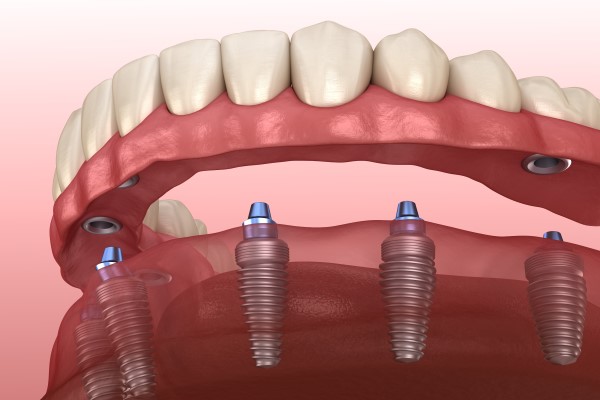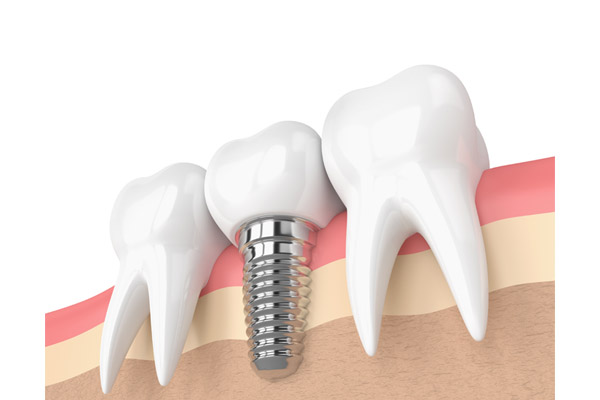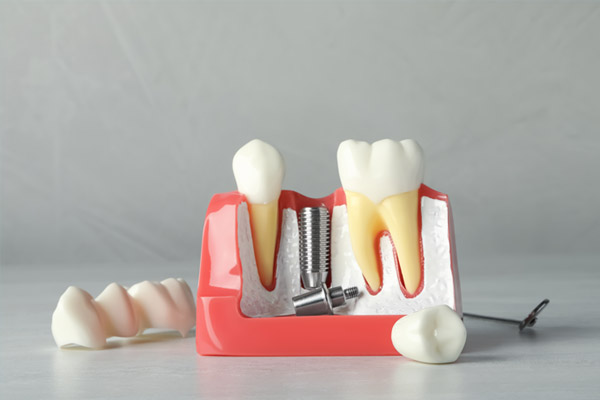Full Mouth Dental Implants for Bottom Teeth Replacement

Full mouth dental implants are typically recommended to people who have lost most of their teeth on one dental arch. It combines implants with dentures, providing a more affordable option than replacing all the missing teeth with implants.
Dentures are more affordable than implants, but they have a few significant drawbacks. For starters, bottom sets of dentures tend to have the worst stability and are prone to shifting while being worn. This leads to various issues like difficulty speaking and sore spots forming due to the appliance's framework rubbing against soft tissues in the mouth. However, attaching dentures to implants, as is the case with implant-supported dentures, makes them virtually as stable as natural teeth.
Replacing your missing teeth with full mouth dental implants
An implant is typically a titanium screw or rod that is surgically placed in the patient’s jaw. It serves as an artificial root and helps prevent the bone tissue loss that people with missing teeth often deal with. Like muscle tissues, bone tissues need regular stimulation to remain healthy. Losing this stimulation leads to bone tissue atrophy. Missing teeth replacement options like dentures and bridges do not replace lost teeth roots, so they do not protect patients against bone tissue loss.
Eligibility
Getting missing teeth replaced with full mouth dental implants starts with a consultation with a dentist. The placement of implants counts as minor oral surgery, so patients need to be healthy enough to recover from the procedure. Immune system disorders and health issues like diabetes hinder the healing process, as do habits like drinking regularly or using tobacco products.
Diagnostics like X-rays might be used to evaluate the thickness of the patient’s jawbone. Patients who lack the bone density needed to support implants might have to get bone grafts before implants can be placed. The procedure will have to wait until they are fully healed from their graft, which can take up to three months. Patients are evaluated individually to determine if they are healthy enough for implants and if their jawbone is thick enough to hold implants.
The process
Placing implants in a person’s jaw starts with the dentist administering a local anesthetic. Incisions might then be made so the dentist can reach the patient’s jawbone. Holes are made with a dental drill, and four to six implants are inserted in each dental arch being fitted for implant-supported dentures. Temporary dentures might be attached at that point to restore the patient’s smile. These dentures are for aesthetics and do not fully restore the function of the lost teeth.
The implants will fuse with bone tissue holding them in place over the next six months via osseointegration. This turns the implants into part of the patient’s jaw. Once the implants have bonded with the surrounding bone tissues, the temporary dentures are swapped with permanent ones.
Frequently asked questions about full mouth dental implants
Patients who are considering full mouth implants probably have many questions. Here are the answers to a few of the most common questions about full mouth dental implants.
Does insurance cover full mouth dental implants?
Most coverage policies do not cover full mouth dental implants. However, some plans may cover at least a portion of the cost, so it is always worth checking with the insurance company to see if there is any coverage.
What are the risks associated with full mouth dental implants?
As with any surgical process, there are a few risks associated with full mouth dental implants. These include infection, damage to the surrounding teeth, and nerve damage. However, these risks are relatively rare and can usually be avoided with proper care and maintenance.
How do I maintain my full mouth dental implants?
Full mouth dental implants require the same care and maintenance as natural teeth. This includes brushing, flossing, and biannual dental visits. It is essential to avoid hard or chewy foods that can damage the implants. Smokers should consider quitting to reduce the risk of infection.
What is the success rate of full mouth dental implants?
The success rate of full mouth dental implants is high. In most cases, the implants will fuse to the bone and last a lifetime with proper care and maintenance.
Who is eligible for full mouth dental implants?
Most healthy adults are eligible for full mouth dental implants. However, certain medical conditions may make someone ineligible for the procedure, including diabetes, cancer, and autoimmune diseases.
Replace your lost teeth
Give us a call or stop by our Winston-Salem clinic to learn more about implant-supported dentures and other ways to replace missing teeth.
Request an appointment here: https://dentalcenterofthecarolinas.com or call Dental Center of the Carolinas at (336) 542-2184 for an appointment in our Winston-Salem office.
Check out what others are saying about our dental services on Yelp: All-on-4 Dental Implants in Winston-Salem, NC.
Recent Posts
Dental implants are a popular choice for patients wanting to replace missing teeth. Formerly, partial dentures and dental bridges were the go-to treatments. However, implants have many advantages. They are more stable than removable dentures and typically last longer than bridges. Using this prosthesis, a dentist can replace a single missing tooth without disturbing any…
When you’re considering having dental implants surgery, you may be curious about the steps following the initial surgery of the implants into your mouth. The next stage is crown placement on dental implants. The crown will sit on top of the implant and work together to help your new teeth work and feel just like…
Anyone who has one or more missing teeth should consider teeth replacement. Fortunately, there are several effective ways to deal with teeth loss. One of the more common and effective methods is dental implant treatment, which involves placing a titanium post into the jawbone to serve as the root for the abutment and artificial tooth. The…
Dentures are removable, custom-made replacements for lost teeth. If you want your dentures to last for a long time, it is crucial to take care of them. This will help you to avoid a wide range of issues. Keep reading to find out more about proper denture care.There are different types of dentures that are…


